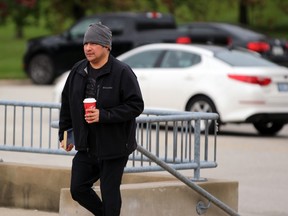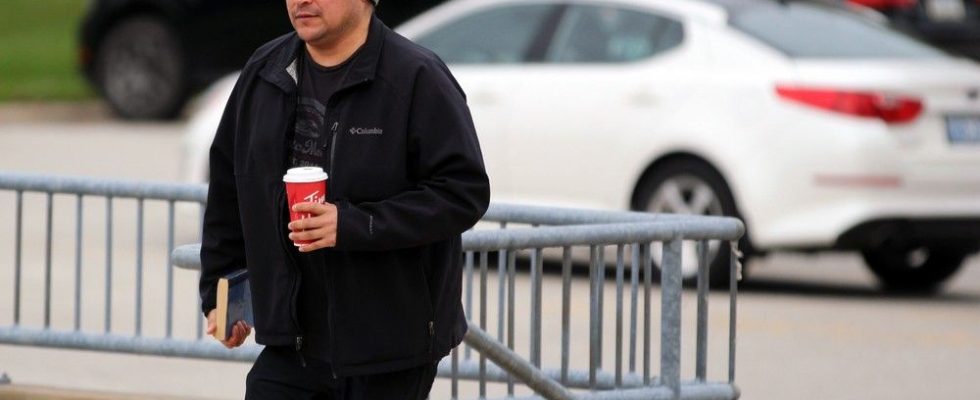Scott Oosterhof, a Sarnia police constable, was usually out on road patrol in the fall of 2020.

Scott Oosterhof, a Sarnia police constable, was usually out on road patrol in the fall of 2020.
Advertisement 2
Article content
But when the front desk phone rang at headquarters shortly after noon on Halloween that year, Oosterhof was the one who answered it, as he was filling in for a co-worker’s lunch break. The caller was an unknown man standing a few meters away in a vestibule between two sets of doors holding a handset with a direct line to the front desk.
Article content
The man made an unsolicited and stunning statement, according to testimony heard this week in a Sarnia homicide trial.
“’I have a confession to make. I may have done harm to my neighbor,’” Oosterhof recalled the man saying.
The surprising statement prompted Oosterhof to ask him: What do you mean?
“’I may have killed my neighbor,’” the man responded, according to Oosterhof. “I could hear the seriousness to his voice with lots of emotion.”
Advertisement 3
Article content
That voice, Oosterhof spoke, belonged to Timothy Nahmabin.
Nahmabin, 45, pleaded not guilty earlier this week to manslaughter in the death of Nada Court, 69, who was found dead at the bottom of a stairwell of the Colborne Road apartment building in which they both lived on Oct. 25, 2020.

Oosterhof was on patrol the morning Court was discovered lying next to a door with broken glass at the bottom of an eight-step staircase and was called to canvasses the area. The investigation was still open, but Oosterhof left the building the day she died believing it likely was a mishap.
The apartment had no surveillance video and Court, a larger woman who recently had knee surgery, had mobility issues and regularly used a cane or a walker.
Advertisement 4
Article content
Nearly a week later, still unsure who the mysterious caller was despite learning his name was Nahmabin, Oosterhof and Steve Ruetz, a staff sergeant who also was working near the front desk, opened the locked front doors at headquarters and asked who his neighbor was.
Court’s name was familiar, but Oosterhof couldn’t recall from where, so he asked Nahmabin how he did it.
“’I pushed her down the stairs,’” the officer testified Nahmabin said.
That’s when it clicked. It was the sudden-death investigation he was at six days earlier. A feeling of hypervigilance came over Oosterhof, he said.
“This guy’s confessing to killing someone,” he testified.
Ruetz, who also testified Thursday, was asked if it was unusual for this type of a confession to occur at the front desk.
Advertisement 5
Article content
“Yes, it is,” he said.

Oosterhof arrested Nahmabin. Both he and Ruetz walked the courtroom step-by-step through the booking process via surveillance video from Sarnia police headquarters captured nearly three years ago.
During cross-examination Thursday, defense lawyer Ken Marley focused on the delay between when his client was told he had the right to call a lawyer and when he actually was permitted to make that call, about 40 minutes. Oosterhof said he tried to get Nahmabin to a phone as quickly as he could, but they were following protocol while also trying to find staffing coverage at the front desk.
Marley asked Oosterhof if a discussion took place between himself and Ruetz about one of them taking Nahmabin downstairs to make the call while the other one stayed at the desk.
Advertisement 6
Article content
“No, it didn’t,” Oosterhof said.
Ruetz pointed out COVID-19 pandemic protocols were in place at the time and a person had just walked into the building and confessed to a homicide.
“This is unusual circumstances,” he said.

Also heard on Thursday, Day 3 of what’s expected to be a two-week trial, was the testimony of Edward Tweedie, a London forensic pathologist who performed the autopsy on Court the day after she died. Tweedie said blunt-force impacts to the head were the main reason she died and said blunt-force injuries can come from being struck by an object or the body being in motion when it strikes a fixed object.
Tweedie said most people who tumble down the stairs wouldn’t sustain the types of injuries she had.
“The extent of these is far beyond the average and at the extreme end,” he said.
But he agreed, at Marley’s suggestion, that a person’s weight would impact the momentum they had as they fell.
The trial, being heard by Superior Court Justice Maria Carroccia without a jury, continues Friday. Nahmabin, who was initially charged with second-degree murder before the charge was reduced to manslaughter, has been out on lease since early 2021.
Article content

Comments
Postmedia is committed to maintaining a lively but civil forum for discussion and encourages all readers to share their views on our articles. Comments may take up to one hour for moderation before appearing on the site. We ask you to keep your comments relevant and respectful. We have enabled email notifications—you will now receive an email if you receive a reply to your comment, there is an update to a comment thread you follow or if a user you follow comments. Visit our Community Guidelines for more information and details on how to adjust your email settings.